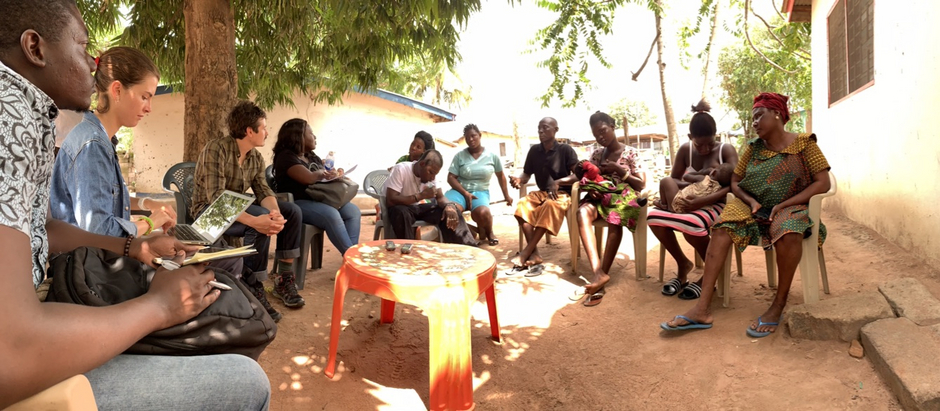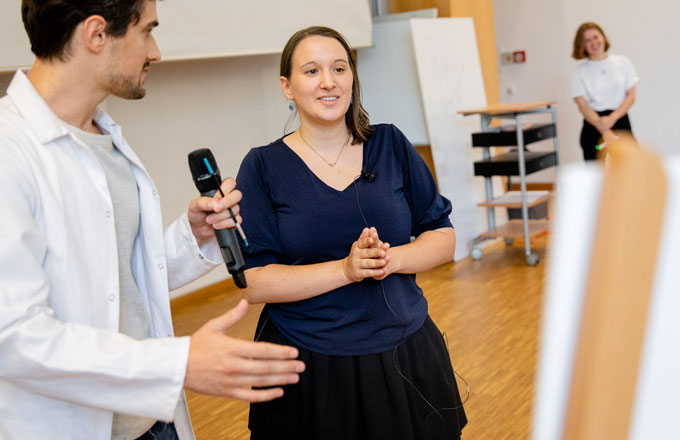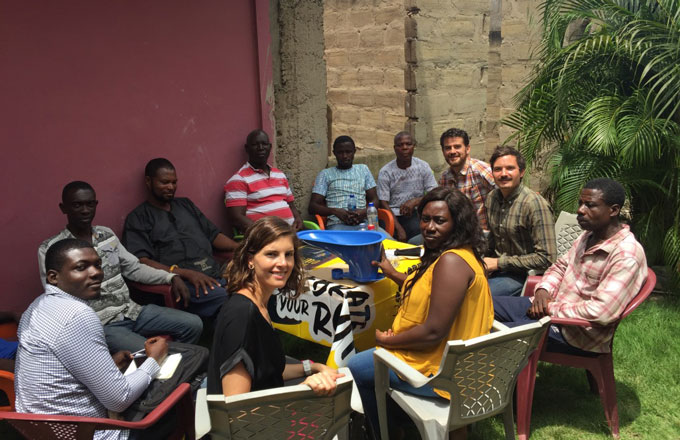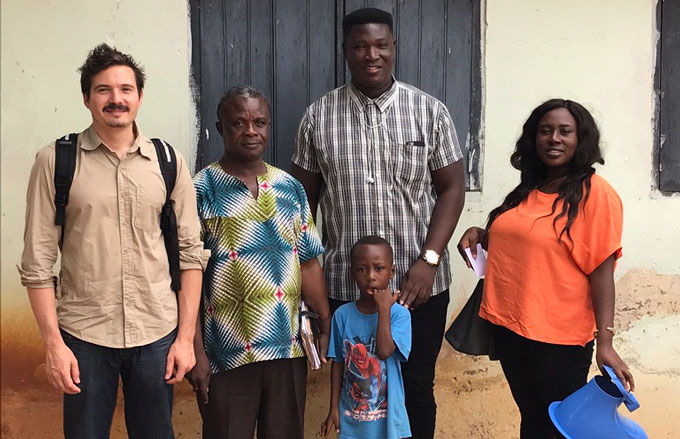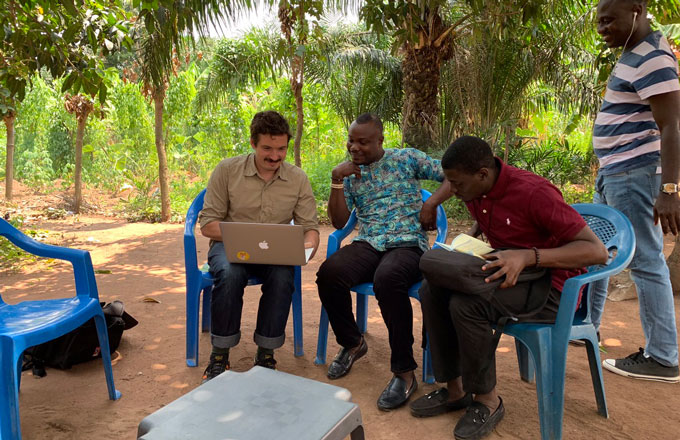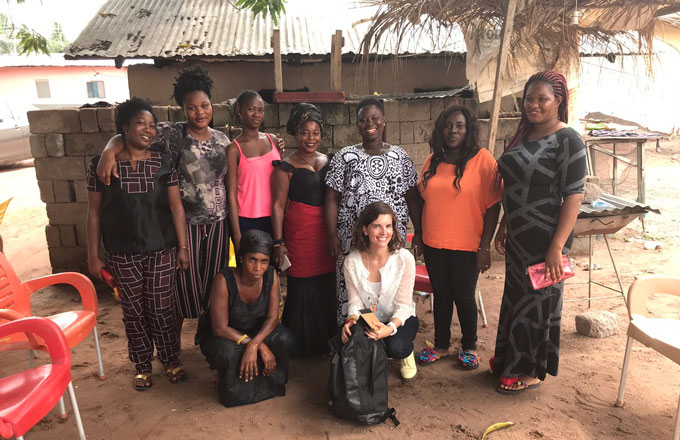In all kinds of intercultural projects, one question always arises: Do we truly understand the culture and the needs of the people our research focuses on?
This question becomes even more crucial when the challenge involves a sensitive topic. Such was the case with the project of Archipel&Co and its project partner Purpose House. The goal was to support the introduction of sanitation innovation aimed at reducing open defecation and to address Goal 6 of the UN Sustainable Development Goals: Sanitation.
In order to truly understand the needs, aspirations and decision-making of the target buyer/user in Ghana, Justin DeKoszmovszky (Managing Partner of Archipel&Co), Laura Arribas (Senior Consultant at Archipel&Co) and Vittorio Cerulli (founder of Purpose House) planned a field research to Ghana.
Time as the enemy – or a driving force for innovation?
The project had various challenges. Not only did the team need to consider the intercultural context; the topic itself was very sensitive. Above all, Vittorio Cerulli and his team only had nine days on the ground to gain a qualitative understanding of the issue and provide a clear orientation of how to solve it. Normally, ethnographic field research trips of this kind take up to two months. How could the team implement this research in only nine days?
From Design Thinking Basic Track to the field: HPI D-School alumna Martina Zelt, Purpose Strategist
While conducting her Design Thinking studies at the HPI D-School, Martina Zelt and Purpose House started collaborating at the Impact Hub in Berlin. When Martina first talked about Design Thinking, Vittorio, who has over ten years of experience in research and innovation, was immediately fascinated by the concept: “What caught my interest from the very start was that Design Thinking is outcome-oriented, it seemed to be very pragmatic and it does something that I love to do: it puts humans first.”
When Vittorio heard that it was possible to create valuable outcomes within a very short period of time, he was all in for embedding Design Thinking in the qualitative approach and address this sanitation challenge.
The qualitative approach project gets the valuable support of Archipel&Co, a team with decades of experience helping clients understand and operate sustainably at the lower-income levels of emerging markets. The goal for Justin and Laura, who designed the overall study, was to deliver qualitative and quantitative insights for a scaled launch of the sanitation innovation.
As part of the field phase, Martina and Vittorio created a detailed plan for the nine days available. “I had to make sure that all parties concerned, and particularly Vittorio, who was leading the Design Thinking process in the field, truly understood the ‘why’ behind each of the Design Thinking steps. Because that’s what equips you to face unexpected changes in the field,” said Martina, who was not able to take part in the fieldwork herself.
On the ground: Innovating and co-creating in Ghana
“This project was special”, recalls Laura Arribas from Archipel&Co. “From the very start, it was clear that everyone in the team was equally involved and the excitement was palpable.”
The core team was international and multidisciplinary—a perfect setup for Design Thinking: Laura (originally from Spain) and Justin (originally from the United States), Vittorio (originally from Italy), the Ghanaian research group El-Parah with Reuben (Project Lead), Henry (Recruiter) and Jumima (Translator), Richard and Rachel from the Ghanaian NGO “Total Family Health Organization.”
Team dynamic upside down
What changed at first sight regarding the teamwork was the “check-in” with the team at the start of a day and the “check-out” at the end – two steps that Design Thinking considers to be very important. “Both steps made a tremendous difference to the research and particularly to the team dynamic,” says Vittorio. The check-in was particularly important for the human connection in the team while the check-out was helpful for our reflection and synthesis.
On typical field trips, Vittorio had the role of the researcher leading the project—usually not sharing his interpretation with the team until the debrief. “It is as if the researcher almost magically creates insights out of random conversations–and rarely could we see how this happens. However, this time we did it collaboratively. I included everyone, as I needed their insight and their dedication to the whole Design Thinking process. As a result the team was much more engaged; it was their project too.”
Building bridges – intercultural collaboration at its best
Jumima, who originally was only supposed to be the translator, transformed completely during the project. “Once she realized that we valued her opinion (and not just her translation) and that we wanted her to be part of the team, she truly openedup”, says Vittorio. In this way, she did a lot more than translate the language, and in fact, she could build the intercultural bridge in a much more insightful way. “From day to day you could see her self-confidence rising. Without the ownership that she took, the whole team would have never been as successful,” says Vittorio.
The interviews: How to talk about a sanitation situation?
In order to understand the situation concerning health care and the problem of open defecation, the team had to talk to many different people and stakeholders. The focus was on the several target groups. Both women and men were of great interest, with the emphasis placed on their role within the family, their future dreams, their fears but also their sanitation needs and their decision-making power within the family.
Moreover, the landlords were an interesting target group. Finally, as Ghana is a deeply religious country living a collective culture, the team also wanted to talk to religious leaders, elders and chiefs of the villages to understand the issue further.
Empathy: The guideline of any qualitative research, and for this project in particular
In the first two phases of the Design Thinking process “Understand” and “Observe,” a high degree of empathy is always required. In this project, empathy was particularly crucial because of the highly sensitive nature of the topic. “There were also some moments of tension. We made sure to build empathy and often justified our questions by saying that we are not Ghanaians and don’t understand the issue well enough. We also found analogies between things that happen in our lives and in theirs,” Vittorio said.
Remote coaching at its best
During the project, something happened that Vittorio later called “the second wave of trust.” His first wave of trust towards Design Thinking was when Martina introduced the method and the mindset. Then, in the middle of the project, he checked with Martina, sending her the interim notes and part of the synthesis.
“When I received her comments on the work, I experienced the second wave of trust. I understood that some of the steps within the method had to be followed exactly and I noticed the difference it made when doing so”, said Vittorio.
The most important finding: The role of woman in addressing sanitation issues
One of the most powerful findings was the role that women played in addressing the issue of sanitation. Women are the ones that feel the strongest need for a hygienic sanitation solution, and they are the ones most affected if this is not the case. At the same time, they are most often not the ones allowed to make the final call. This has always been up to the husband, even if the women in question have their own money. It is simply not up to them because the issue of sanitation is strongly considered to be the man’s duty.
Prototyping: “How could this have happened in only 20 minutes?”
“When it came to ideation and prototyping, it was almost as if the moment of truth had arrived,'' Vittorio recalls. After all the interviews and the extraction of insights, we all started a creative ideation session, everyone was truly involved, and we came up with new and actionable ideas.
“To be honest, I was expecting a long and boring qualitative brief with a lot of text to read… instead there were human stories, pictures and prototyping. It was fun!” said Rachel summing up the day.
Justin from Archipel&Co also added: “I have been involved in other prototyping sessions, but this one was particularly powerful. In only a few hours we created three valid and promising prototypes that reflected the days of research in a meaningful way.” Jumima from El-Parah adds: “And it wasn’t even necessary to repeat everything again and again. The team was already on the same page.”
The outcome: Empowering women
One of the three prototypes addressed the role of women in sanitation: A leaflet with information and guidance on how to bring up the topic of sanitation to their husbands, how to talk about their needs and propose financially viable solutions.
“We have seen how by providing certain information in a specific way, women become empowered to take a stand for their own health and the health of their families,” says Vittorio.
Design Thinking: An Approach for Solving Purposeful Problems
What impressed Vittorio was also the speed of the process. Normally to get from research to insights and then to prototype takes around two months. With Design Thinking, it all happened in just a few days, with the outcomes actionable and relevant.
“It is safe to say: The innovation process worked!” says Vittorio, founder of the Purpose House. “And when it comes to qualitative research or generally to projects where I have to go quickly from insight to action, I will most certainly apply Design Thinking again.”
About Archipel&Co:
Archipel&Co is focused on one mission: Design, test and scale business solutions to social challenges. Our ambition is to generate customized answers and operational solutions for our clients. We do this by opening up new perspectives on social responsibility and issues such as social innovation and market-based approaches to social issues, collaborative economy and social impact, stakeholder and community relations. Find out more: https://archipel-co.com/
About Purpose House:
Purpose House is a collective of insights and brand experts, sustainability professionals, designers and strategists who care about the world we live in. Their mission is to help brands create long-lasting positive impact and appeal by acting with strong purpose and cultural relevance – across what they do, how they live and what they say.
Find out more: https://www.purposehouse.co.uk/
About Martina Zelt:
Martina is a communication professional and Purpose Strategist with work experience in diverse intercultural environments and a background in Work and Organizational Psychology. Her passion to create a positive impact by using the power of storytelling, empathy and innovation led her to apply for the basic track at HPI. Having added Design Thinking to her skill set, she is now even better equipped to solve meaningful problems in innovative ways.
Photos: Justin DeKoszmovszky

